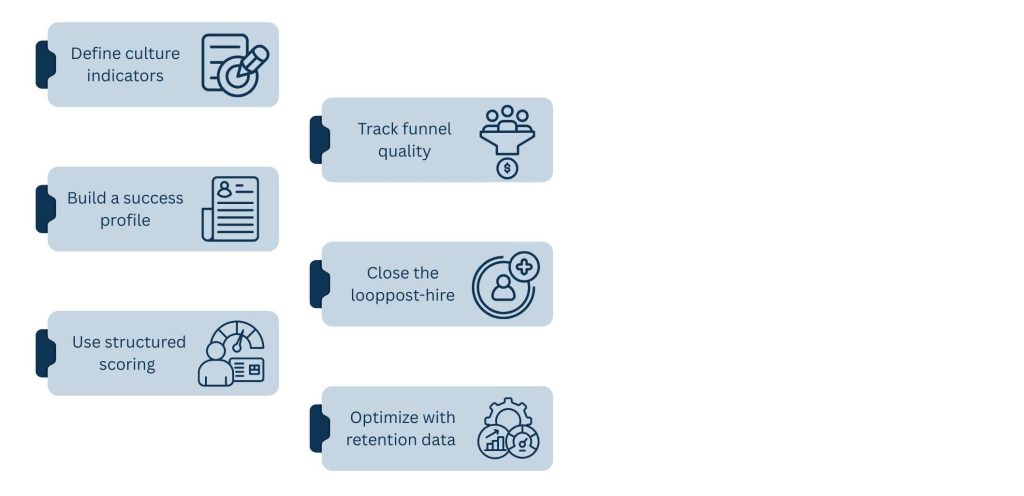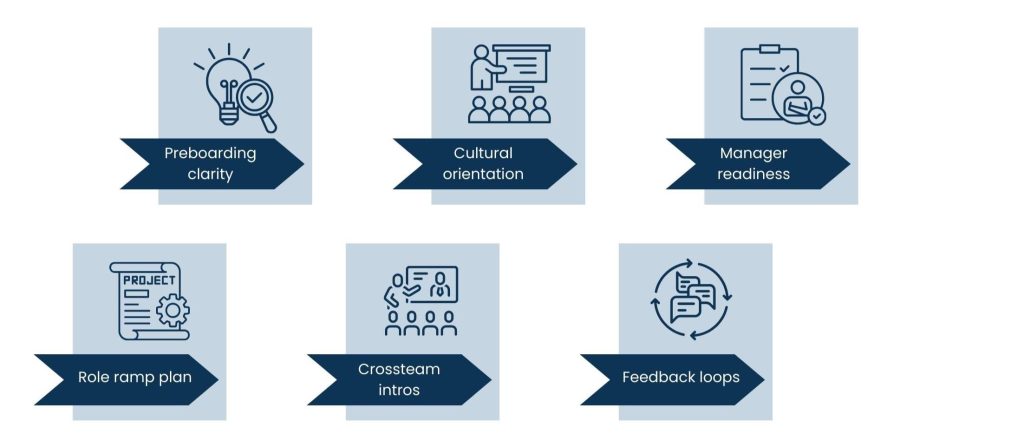Introduction
There’s a lot more to being a human resources recruiter than just filling a job vacancy; they play a huge part in the development of company culture from the very beginning. Each hire changes the math of employee-to-employee interactions, team creation, and organizational growth. This is the reason recruiters’ impact is a lot more than what happens in the interview room, on the brand that the company is, in the long term.
An HR recruiter is a talent defender who finds the company worth the candidate while valuing the post. And they don’t just evaluate skills; they judge attitudes, behaviors, and potential cultural fit. They know that every working newcomer brings with them like-minded values in which the company believes.
When done well, their work contributes to the building of a work environment in which people feel a sense of belonging, purpose, and engagement. The result? Here is a team that is working together towards the common good of collective achievements, along with a happy and well culture.
Aligning Recruitment with Company Values with Human Resources Recruiter
Human resources recruiters start building company culture by getting to know the company’s values at its core. These are the values that underpin all recruitment practices. Without this fit, exceptionally qualified candidates can have difficulty finding success in the company.

Recruiters can make this alignment because of a combination of:
1. Alliance with Leadership:
A human resources recruiter partners with the leadership of the company to determine long-term goals and what talents will be instrumental to achieve those goals.
2. Creating Great Job Descriptions:
In addition to skill requirements, job descriptions reveal cultural components like teamwork, innovation, or flexibility so that candidates know what they’re getting into before they apply.
3. Measuring Soft Skills:
Technical skills can be taught, but cultural fit is a lot harder to instill. During recruitment, recruiters pay attention to communication style, adaptability, and EI, which tend to make the new employees successful.
4. Culture-Focused Interview Questions:
Queries that reveal how an applicant deals with conflict, or works under pressure, or helps in team wins, reveal a lot about their operative compatibility.
5. Unified Messaging:
Online communications are all consistent from that intro email to the final offer letter, all sounding like they come from the same place. This offers candidates an accurate first impression from day one.
An HR recruiter includes these values in their hiring process so that each hire not only brings such principles to the bottom line but also to the cohesion of the team. Over time, this consistency creates a work environment where people are ready to act in line with the organization’s mission and values.
Human Resources Recruiter Building Long-Term Cultural Impact
The impact of a human resources recruiter doesn’t stop after a candidate is selected. The onboarding process is a sensitive time where culture is instilled and expectations are established.

And here’s how recruiters work to bake it in long-term:
1. Structured Onboarding:
An efficient and positive onboarding process, where recruits are welcomed into the company and given a visit to the company, knowledge of how the whole company works, and an understanding of what the company wants to achieve.
2. Continuing Touch:
Recruiters frequently follow up with the new hire and the manager to make sure they are on track and that expectations are being managed, and the culture fit is in place.
3. Feedback Loops:
Recruiters are capturing feedback from both parties, which, over time, will help refine our hiring process to better fit cultural needs.
4. Internal Branding:
Recruiters make employees and featured stories the focus, help share team accomplishments, and keep morale high.
5. Retention Strategies:
Part of a recruiter’s role includes working with HR to develop programs to improve employee retention and decrease turnover.
When culture grows consistently, employees feel a connection to it and play an active role in helping it rise.
A good human resources recruiter helps craft and maintain such a culture deliberately to maintain the health of the organization.
Harnessing Data & Analytics For Cultural Hiring
Whether you’re a hiring manager or an HR recruiter, data provides you with insights into what culture fit is in your organization. In place of blind instinct, you map values to specific behaviors and tangible results with data-driven hiring decisions.

Here’s how to make that real — how to apply analytics from interview to onboarding:
1. Define culture indicators
Map core values to behaviors you can observe via interviews, assignments, and probation.
2. Build a success profile
Study high performers for signs of patterns in collaboration, learning pace, and feedback habits, and then use those signals in hiring.
3. Use structured scoring
Use common rubrics to evaluate all the soft skills, so that all the candidates are evaluated for the same thing.
4. Track funnel quality
Track pass rates by interviewer, source, interview stage, and other attributes to uncover and eliminate bias.
5. Close the looppost-hire
To conduct your predictive validity analysis, simply gather manager and new hire feedback collected 30, 60, and 90 days post-hire.
6. Optimize with retention data
Tie early onboarding indicators to tenure and engagement so you continue to refine the model.
Where a human resources recruiter bases their decisions on evidence, culture calibration is consistent and impartial. Over time, you hire people who flourish in your environment, and you can reduce the cost of misfires while lifting team performance.
Dealing with Cultural Fit Hiring Difficulties: For Human Resources Recruiters
Whether you’re iterating your process or landing and scaling your team, a recruiter for the human resources industry is well aware that “culture fit” can be misconstrued. The aim is not sameness, but shared values.

Follow these steps to preserve culture but make room for diversity:
1. Define values, not vibe
Substitute vague talk of “fit” with concrete behaviors such as ownership, candor, and customer focus.
2. Standardize interviews
Pose the same behavioral questions and use a rubric to score them, to avoid bias.
3. Widen the talent pool
Source from new schools, communities, and platforms to broaden perspectives.
4. Use work samples
Assess a candidate’s ability to work with others and communicate through hands-on exercises.
5. Calibrate interviewers
Train panelists on what good looks like and check for score variance to ensure standards remain in line.
6. Audit decisions
Track declines and offers by demographic and source to identify patterns before they emerge.
By putting values and evidence above all else, a human resources recruiter can prevent groupthink and lead teams that are both coherent and creatively diverse. And in that balance is where culture piles up.
How Human Resources Recruiter Advocates For Diversity And Inclusion?
Also near the front lines for real inclusion: An HR recruiter, whether you’re making hiring goals or working to establish who you can reach out to. New perspectives increase creativity, decision quality, and resilience.

Here are some steps that can help you turn intention into action:
1. Write inclusive job posts
Speak, fact from must-haves, and embrace the non-linear career path.
2. Broaden sourcing
For community groups, return to work programs, and remote talent from around the world.
3. Assess skills fairly
Value interviews with structure and actual tasks more than pedigree signals.
4. Create accessible experiences
Invite people to interviews at odd hours, share prep materials, and think about accessibility.
5. Set goals and report
Monitor pipeline diversity, offer rates, and time to hire by stage to create accountability.
6. Support belonging after hire
Pair new hires with mentors, ERGs, and logical growth paths.
Once these practices are integrated by a human resources recruiter, inclusion is now a part of the daily operations of an organization. You don’t just hire a team that looks different; you help everyone in the team to contribute at their best.
Onboarding Techniques by a Human Resources Recruiter That Improves Retention
Whether you’re onboarding one new team member or a whole cohort, the first ninety days will determine long-term engagement. A human resources recruiter sets up their expectations and gets them on the way; they tend to stay on.

Create an onboarding process that reinforces culture on day one:
1. Preboarding clarity
Before Their First Day, provide them with their schedule, tool access, and a clear success plan for day one.
2. Cultural orientation
Share stories of values in action and how decisions were made.
3. Manager readiness
Supply managers with a 30–60–90 plan, check-in prompts, and feedback cadence.
4. Role ramp plan
Offer a week-by-week road with early victories and immediately visible results.
5. Crossteam intros
Facilitate purposeful meetups so new hires can figure out who does what.
6. Feedback loops
Conduct short pulse surveys and recruiter check-ins to quickly resolve friction.
A well-designed onboarding sends people into their new role with confidence, connection, and clarity. A human resources recruiter oversees the experience, retention climb, and culture feels genuine from the get-go.
Conclusion
From the initial handshake to the offer letter, a human resources recruiter shapes a company’s culture and sets its tone. By making hiring decisions that are aligned with company values, evaluating for more than technical skill, and encouraging long-term employee investments, they guarantee that every hire builds a stronger company.
Culture is not a one-off thing that you establish, but just something that you do or have. Recruiting managers, who are skilled at accomplishing this, serve as cultural architects who intentionally create cultures where individuals feel valued, nurtured, and are excited to share their remarkable talents.
In the end, their role is far more than filling chairs. They work hard to influence the company’s culture, culture fit, orientation, and all things intended to make sure that every new hire is not only a fit for the position, but for the heart of the business.
Ready to streamline your hiring process? Contact Tasks Expert today and transform the way you recruit.
About Us
Tasks Expert offers top-tier virtual assistant services from highly skilled professionals based in India. Our VAs handle a wide range of tasks, from part time personal assistant to specialized services like remote it support services, professional bookkeeping service etc. Furthermore, it helps businesses worldwide streamline operations and boost productivity.
Ready to elevate your business? Book a Call and let Tasks Expert take care of the rest.









